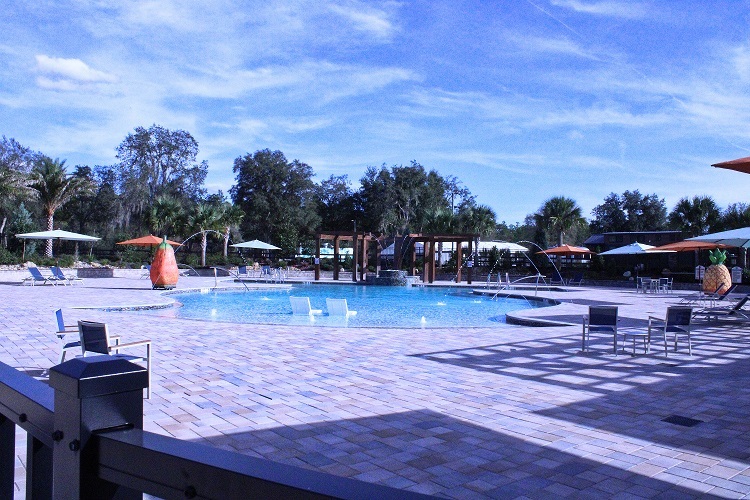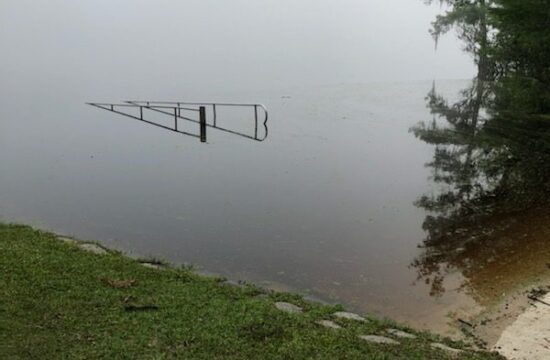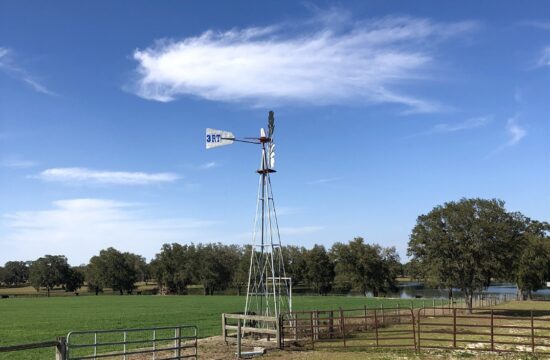By Terry Witt – Spotlight Senior Reporter
Billionaire businessman Reid Nagle is suing to overturn a county decision denying an agricultural classification on 15 acres of Black Prong Equestrian Village that he claims is an essential part of the equestrian resort, but the county says the facility’s fancy swimming pool, super nice restaurant, and classy rental cabins aren’t really agriculture.
The lawsuit was filed on Dec. 21, 2022, under the corporate name of 6851, LLC, but the Black Prong website said Nagle and his wife are the owners. The lawsuit names Property Appraiser Jason Whistler, Tax Collector Michele Langford, and Jim Zingale, executive director of the Florida Department of Revenue as defendants.
While the lawsuit isn’t connected to current efforts by Nagle’s staff to support a proposed amendment to the Levy County Land Development Code that would legalize the operation of manure composting facilities in agricultural rural residential areas, the development of the composting law and the lawsuit are occurring at the same time and both could influence Levy County’s future.
The composting amendment would open the door to the establishment of what opponents are calling “manure dumps” in residential areas of Levy County, and if Nagle wins his lawsuit, it could redefine what is meant by agritourism in Florida and allow resorts like Nagle’s to get agricultural classification for facilities they say are related to the main agricultural operation and are needed to attract tourists.
Nagle has been granted an agricultural classification on 75 acres of Black Prong Equestrian Village but the lawsuit seeks to overturn a decision by former Interim Property Appraiser Randy Rutter that was later upheld on a 3-2 vote by the Levy County Value Adjustment Board to deny an agricultural classification for the remaining 15 acres of the equestrian resort.
Swimming Pool, Wetlands Issue
Property Appraiser Jason Whistler, who wasn’t part of the initial decision to deny the reclassification of the 15 acres, is being sued because he is the elected property appraiser now and supports Rutter’s refusal to honor Nagle’s request for an agricultural classification on facilities that Rutter and Whistler say aren’t directly related to the housing and training of horses.
“I saw their point of why they need those amenities to attract that clientele but to grant agriculture on a swimming pool, I just couldn’t do it,” Whistler said.
Rutter said a management official at Black Prong told him privately that the main reason the company wants the agriculture classification on the remaining 15 acres is to get out from under the requirements of the Suwannee River Water Management District. The district has already forced Black Prong to tear down a large building next to a wetlands area. If the entire resort was agriculturally classified, Black Prong might not face such stringent requirements from SRWMD. Agricultural property owners have far more leeway when it comes to adding buildings to their property.
In the lawsuit, Black Prong’s lawyers argue that the resort’s existing structures and ongoing equestrian activities have occurred for 20 years. The lawsuit said those ongoing equestrian agricultural activities are the reason why the agricultural classification was granted on the 75 acres.
Ag Classification Shouldn’t Be Denied
The lawsuit, citing Florida law, said an agricultural classification, “may not be denied or revoked solely due to the conduct of agritourism activity on a bona fide farm or the construction, alteration, or maintenance of a nonresidential farm building, structure or facility on a bona fide farm which is used to conduct agritourism activities.”
“6851’s remaining 15 acres of land consist of a pavilion, pool, gym, parking, food truck and RV pads. These buildings, structures, and facilities, along with the agritourism education, recreation, cultural, ceremonial, training, exhibition, and supporting equine uses and activities are an integral part of 6851’s agricultural operation” consistent with state law, the lawsuit states.
The lawsuit also notes that the Levy County Commission approved a Planned Unit Development (PUD) in March of 2022 for Black Prong that specifically allowed a master plan of development on the 90-acre property including an equestrian hub, hospitality and event center, lodging, and recreation areas.
Specifically allowed by the PUD were barns with apartments and stalls, turf arena, horse obstacle course, pasture and paddocks, animal care, grooming, and veterinary services; spa, event storage, café, wedding garden, courtyard and space, restaurant, lounge, covered equestrian livestock arena, parking, RV sites, equestrian family lodging, equestrian event lodging, transient rental tree houses, transient rental little homes, swimming pools, hot tubs, recreational areas, horse-drawn carriage rides, season carriage driving, horseback trail riding and lessons, cook-out huts, pool house, gym, restrooms, sports court, dog park and mini golf course.
Black Prong’s Agritourism
“All of those allowable structures and uses under the PUD are integral to 6851’s equine agricultural and agritourism activities. The underlying 75-acre equine agricultural operation is supported by the integral agritourism activities conducted on the remaining 15 acres. When the entire property is considered together with the related and integral agritourism structures and uses with its supplemental and critical income, the remaining 15 aces should be classified as agricultural,” the lawsuit said.
Whistler and Rutter argue that the remaining amenities that Black Prong considers essential to its agritourism activities don’t fall under the category of bona fide agriculture and are not an integral part of the facility’s agriculture operations and Whistler hasn’t decided if he will retain the existing agricultural classification on the remaining 75 acres.

————————–
Enterprise Reporting by Terry Witt April 24, 2023; Posted April 24, 2023













